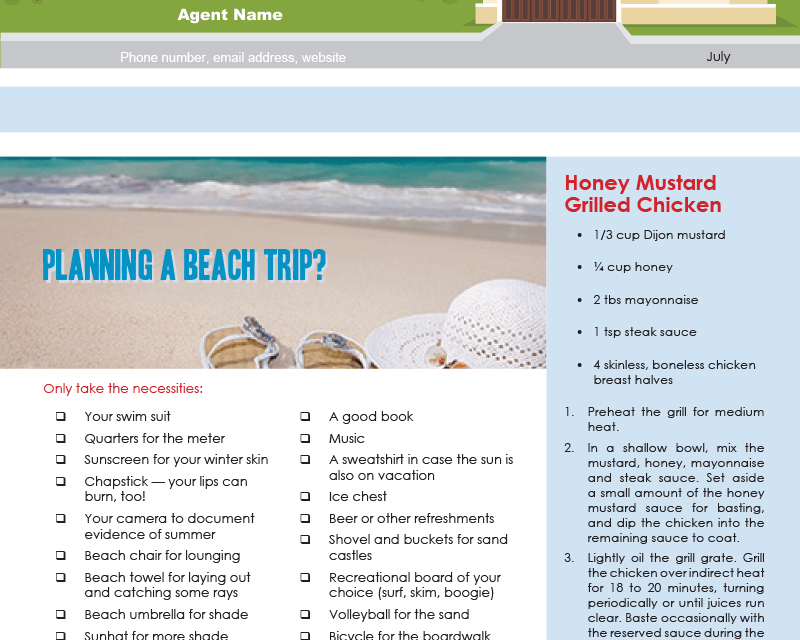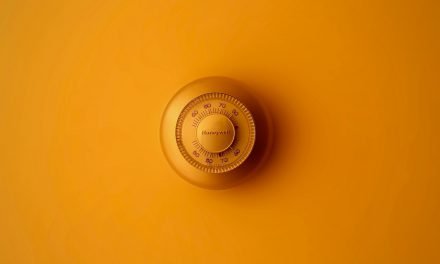Use this first tuesday FARM Letter in your marketing. To request a FARM letter topic, or to see a list of all our FARM letter templates, visit our FARM Letter page.
Download the Personalization Instructions Download the PDF Template Download the Microsoft Word TemplateText only
Marinated Flank Steak
- 1/2 cup vegetable oil
- 1/3 cup soy sauce
- 1/4 cup red wine vinegar
- 2 tbs fresh lemon juice
- 1 ½ tbs Worcestershire sauce
- 1 tbs Dijon mustard
- 2 cloves garlic, minced
- 1/2 tsp ground black pepper
- 1 ½ pounds flank steak
- In a medium bowl, mix the oil, soy sauce, vinegar, lemon juice, Worcestershire sauce, mustard, garlic and ground black pepper. Place meat in a shallow glass dish. Pour marinade over the steak, turning meat to coat. Cover and refrigerate for 6 hours.
- Preheat grill for medium-high heat.
- Oil the grill grate. Place steaks on the grill and discard the leftover marinade. Grill meat for 5 minutes per side, or to desired doneness.
Planning a beach trip?
Only take the necessities:
- Your swim suit
- Quarters for the meter
- Sunscreen for your winter skin
- Chapstick — your lips can burn, too!
- Your camera to document evidence of summer
- Beach chair for lounging
- Beach towel for laying out and catching some rays
- Beach umbrella for shade
- Sunhat for more shade
- Sunglasses to fortify your sunhat
- Sandwiches and fresh fruit
- Cash for an afternoon ice cream
- A good book
- Music
- A sweatshirt in case the sun is also on vacation
- Ice chest
- Beer or other refreshments
- Shovel and buckets for sand castles
- Recreational board of your choice (surf, skim, boogie)
- Volleyball for the sand
- Bicycle for the boardwalk
- Firewood for after dark
- Marshmallows to roast over the firewood
- Your children (optional)
Your July Maintenance Tip
Need to cool your home? Consider installing a whole house fan. Whole house fans are an alternative type of home cooling unit. They come in two main construction models: belt-driven, and direct-driven. Direct-driven fans are cheaper, but tend to be noisier than belt-driven fans.
Q: How does it work?
A: Simply open up a few windows and switch the fan on! The fan draws in cool air from outside and moves it through your home to create a breeze. Hot air in the home gets pushed up into the attic where it is ventilated. An additional attic fan can be paired with the whole house fan to push hot air out of the attic more effectively.
Q: Why should I add a whole house fan?
A: A whole house fan can be paired with your air conditioner to reduce your monthly cooling cost. It won’t replace air conditioning on those sweltering summer days. It will, however, work very efficiently to get cool air from the outside into your house. The added aeration will freshen up your home by forcing out odors and indoor pollution.
SAVE MONEY ON COOLING COSTS
The average American homeowner spends $2,200 a year on utilities. Half of this amount goes towards heating and cooling costs, so keep your HVAC unit up-to-date and in shape. Add these to-dos to your summer HVAC maintenance checklist:
For your HVAC unit
- Shade the unit: Use a tarp, install a fence or plant some vines or shrubs to cool the unit up to six degrees.
- Tidy up: Clear away all plants, grass and debris within two feet of the unit.
- Replace the filters: Replace or clean washable air filters every month during the summer.
- Take your temperature: Adjust the temperature on the thermostat by a single degree – it can save up to nine percent of your utility costs.
For your home
- Stay moderate: Install a programmable thermostat and set the HVAC to 78 degrees when you’re in the house and 85-88 degrees when you’re out.
- Use ceiling fans: Ceilings fans are inexpensive, come in a variety of styles to suit your home and will make you feel five degrees cooler.
- Light it down: Interior lighting produces heat, so use natural light during the day if you can. Replace incandescent light bulbs with compact fluorescent (CFL) bulbs which produce a fraction of the heat and cut energy use up to 12%.
- Chores are cool: Cooking and cleaning create heat. Save the laundry and dishes for the coolest hours of the day.















